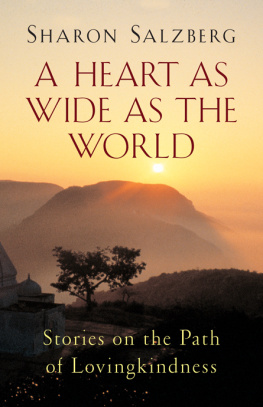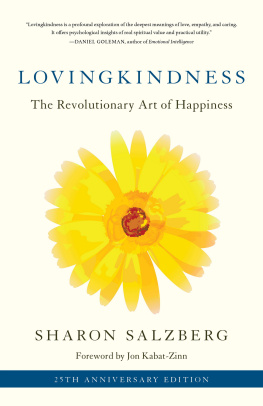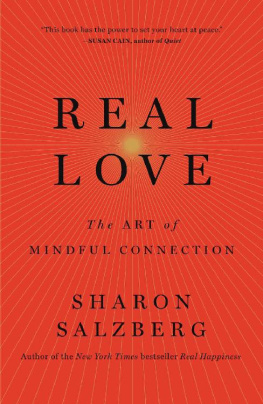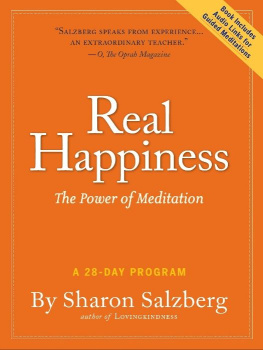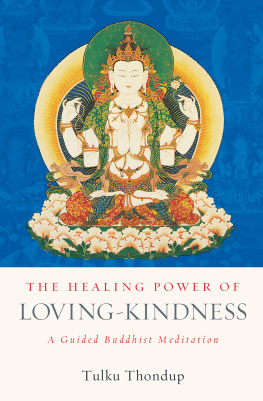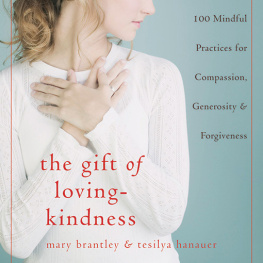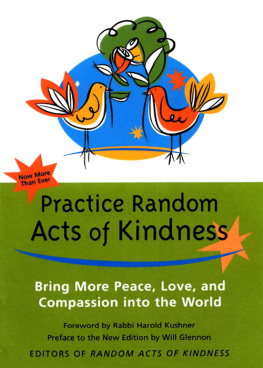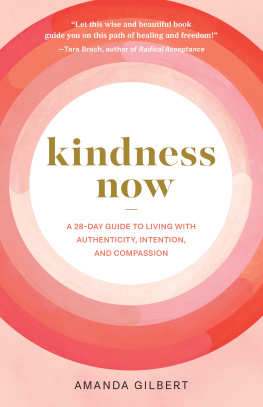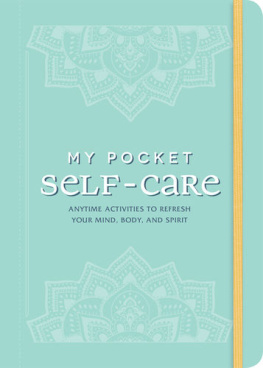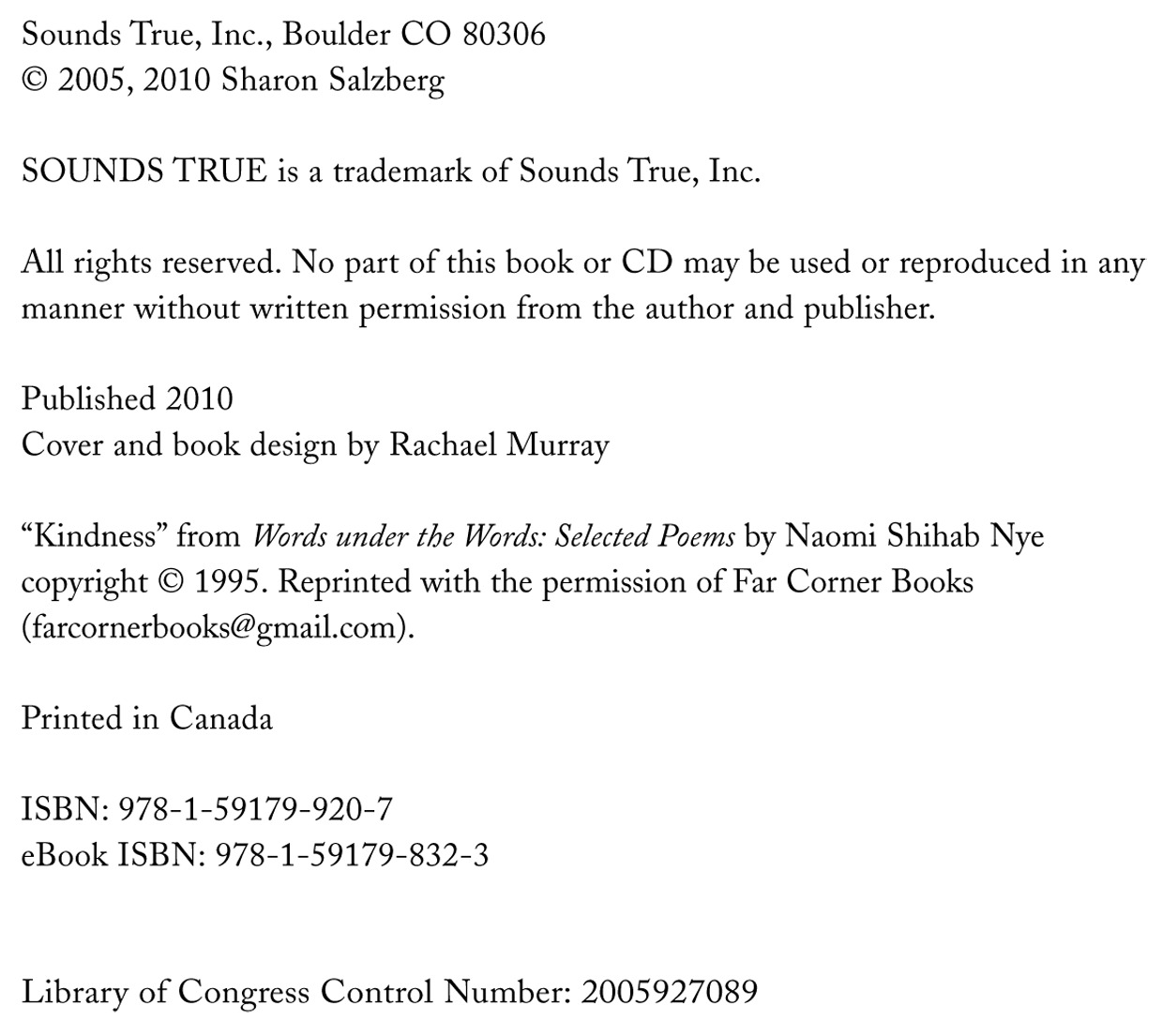
Copyright
Also by Sharon Salzberg available from Sounds True
Books
The Kindness Handbook: A Practical Companion, 2008
Spoken-word Audio
Guided Meditations for Love and Wisdom: 14 Essential Practices, 2009
Insight Meditation: An In-Depth Correspondence Course, 2004
Lovingkindness Meditation: Learning to Love Through Insight Meditation, 2004
Interactive Learning Kits
Insight Meditation (with Joseph Goldstein), 2002
Unplug: ... For an Hour, a Day, or a Weekend, 2008
Introduction
I have been engaged by kindness nearly my whole life, fascinated by it at times, repulsed by it at others. Particularly when I was young and others extended kindness to me, I felt humiliated by the apparent evidence of my pain. I hated that anyone could see that I was hurt. And yet, now I see that those early gifts of kindness planted the seeds of a nascent self-love within me. Those seeds were really what allowed me, more than anything else, to survive the often painful circumstances of my childhood. As I got older, I was less resistant to acts of kindness, more moved by them, more able to acknowledge how important they had been and still were to me.
Since then, the pursuit of kindness has magnetized much of my spiritual journeythat is, once I got over my disdain of it as an also-ran quality, the kind of characteristic you cultivate if tougher, finer things like wisdom elude you. As I continue my meditation practice every day and try to live out my deepest values every day, kindness has only grown in importance as a crucial element of those efforts.
It is not a cushy, undemanding path. It is easy to overlook the power of kindness or misunderstand it. The embodiment of kindness is often made difficult by our long-ingrained patterns of fear and jealousy. Those around us may devalue our dedication to kindness. We may devalue it ourselves. There are many challenges, many subtleties, many intricacies. But if we can commit to the open-hearted exploration of kindness, it will reveal itself as a force that can change our lives.
Sharon Salzberg
Kindness
Before you know what kindness really is
you must lose things,
feel the future dissolve in a moment
like salt in a weakened broth.
What you held in your hand,
what you counted and carefully saved,
all this must go so you know
how desolate the landscape can be
between the regions of kindness.
How you ride and ride
thinking the bus will never stop,
the passengers eating maize and chicken
will stare out of the window forever.
Before you learn the tender gravity of kindness,
you must travel where the Indian in a white poncho
lies dead by the side of the road.
You must see how this could be you,
how he too was someone
who journeyed through the night with plans
and the simple breath that kept him alive.
Before you know kindness as the deepest thing inside,
you must know sorrow as the other deepest thing.
You must wake up with sorrow.
You must speak to it till your voice
Catches the thread of all sorrows
And you see the size of the cloth.
Then it is only kindness that makes sense anymore,
only kindness that ties your shoes
and sends you out into the day to mail letters and purchase bread,
only kindness that raises its head from the crowd of the world to say
It is I you have been looking for,
and then goes with you everywhere
like a shadow or a friend.
Naomi Shihab Nye
one
Compassion in Action
Kindness is compassion in action. It is a way of taking the vital human emotions of empathy or sympathy and channeling those emotions into a real-life confrontation with ruthlessness, abandonment, thoughtlessness, lonelinessall the myriad ways, every single day, we find ourselves suffering or witnessing suffering in others.
Yet growing up I had the impression that a kind heart ranked awfully low in cultural desirability, well after a sound head, a sharp wit, invulnerability, power over others, a fine sense of irony, and countless other qualities. The hero I saw displayed in the movies was fiercely resolute; the sidekick, trailing after the hero, picking up the pieces, might have been kind. The overwhelmingly popular girl on TV was striking, imposing, amusing; the second banana was usually kind and a lot less magnetic or interesting.
Today as well, when we think of adventure, going out on a limb, being bold, or being on the edge, it is rarely in the direction of caring, of compassion. Usually we externalize our sense of adventure and think of climbing mountains or jumping out of airplanes. Our idea of taking a risk is to be more ambitious, maybe more competitive. To be bold translates as being more hard-bitten and not noticing the consequence of our actions on others. To be brave has no gentleness or sensitivity associated with it.
On the face of it, kindness can seem wimpy, a cop-out, an excuse to do just a little bit to try to make a difference when so very much needs to be done. We might see kindness as the rationale for feeling good after speaking nicely to a homeless person we meet on the street, without having to consider basic injustice and what steps have to be taken to help that person and others like him or her to not suffer anymore. We might delegate kindness to the category of a quaint, old-fashioned virtuenot very effective, and certainly not very powerful. We might disdain kindness as a way of promoting separation and a hierarchy of distinctions: I, who am superior and untouched by your problem, will help you, who are inferior and in a bad way. We might dismiss kindness as the last, frail stand of righteousnessthe lesser state we turn to in some
dismay when wisdom, clarity, incisiveness, and intense love all have seemed to fail us and we havent been able to make any substantial difference in someones life.
***
A commitment to kindness can be the thread that twines throughout our various successes, disappointments, delights, and traumas, making our lives seamless, giving us ballast in a world of change, a reservoir of heartfulness to infuse our choices, our relationships, and our reactions.
Many of us long for an underlying sense of meaning, something we can still believe in no matter what happens to us, a navigational force to pull all the disparate pieces of our lives together into some kind of whole. Perhaps we find ourselves feeling helpless when even a little too much of the unexpected occurs. Or we feel defenseless when we find we dont have control over a situation and cant fathom what might happen next, unsure of where to turn when we arent having the positive effect we want with a troubled family member or a friend. In any of these circumstances, and in so many more, we shut down. Then we go through the motions of our day, day after day, without much dynamism or spirit.
Many of us experience ourselves as fragmented, perhaps as confident and expressive when we are with our families but a completely different person when we are at work, frequently hesitant and unsure. Perhaps we take risks when we are with others but are timid when alone, or we are cozily comfortable when alone yet are painfully shy and withdrawn when with others. Or maybe we drift along with the tides of circumstance, going up and down, not knowing what we might really care about more than anything else, but thinking there must be
Next page

